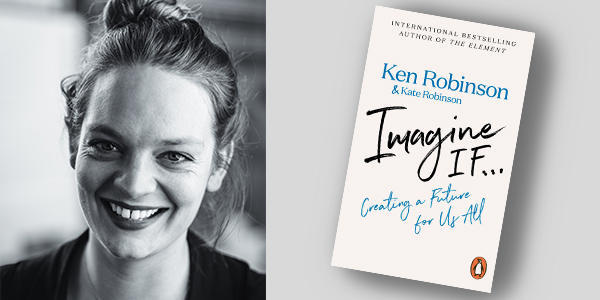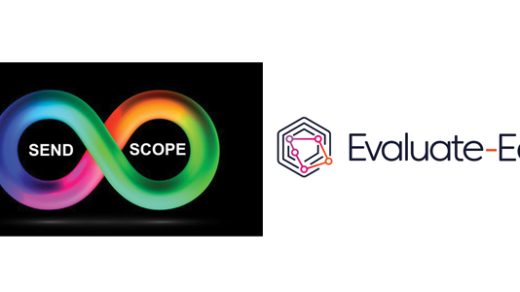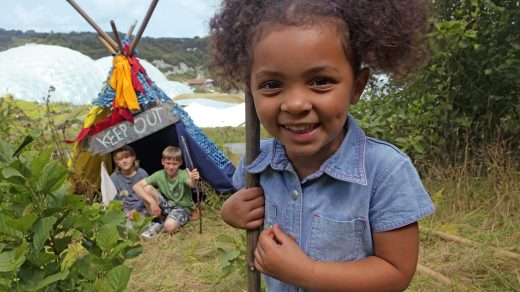Kate Robinson: Creating a future for us all

Liverpool-born Sir Ken Robinson will forever be an influential figure in education. His TEDTalk ‘Do schools kill creativity?’ from 2006 is the most watched online with more than 66 million views. He championed creativity and stressed that the education system needs to cultivate creativity and divergent thinking rather than being focused on measurable academic knowledge.
Before Sir Ken passed away, he asked his daughter Kate to complete the book he had been working on for many years. Earlier this month the book was published and Educate had the opportunity to chat with Kate to find out more about the meaning of the book and the process of writing it without her dad by her side.
Kate, please tell us about the concept of the book ‘Imagine if…’?
The book is a manifesto. It is the distillation of all of my dad’s core arguments and beliefs. The primary concept essentially is that as a species we are currently facing two climate crises: the climate of our natural resources, so the planet’s resources that we depend upon to survive, and then another one which is a crisis of our human resources, so the diversity of talents and skills that our cultures need to survive.

That’s kind of the core argument of the book and we explore why that is happening, but also why it’s important that we fix it as soon as possible. The premise essentially is that we have to become more creative, not less, to address this and we have to channel our powers of creativity into a more determined vision of the future we want to create.
What is the main message you want readers to take from the book?
The main message is that as a species we are capable of incredible things. Our imaginations have taken us to these incredible highs, for example, we’ve gone to the moon! But they have also brought us incredible lows but within each of us is a fountain of resource, talents and passions. Imagine what it would look like if we created our system so that they brought everybody up instead of keeping us down.
If we valued the rainbow of talents and passions that we have, instead of just highlighting a few of them and suppressing the other ones, just think of what we could do under the right conditions.
Whilst I was writing the book what really struck me was that whilst dad’s work is a criticism of our systems, there is this incredible admiration of what we’re capable of achieving. Imagine if we lived up to our full potential as we are capable of incredible things as a whole, but also individually.
Why is creativity, collaboration and compassion so important?
They are important because they are what separates us from the rest of life on earth. In particular, we as a species through creativity have totally transformed our existence but if you pair that with compassion and collaboration that’s when we really shine.

What the pandemic has shown us is that we have to be adaptive. We have to be creative and we must be able to bend to the circumstances that get thrown about the course of life. We are a collaborative species. We are social creatures and I think a lack of compassion is still responsible for a lot of the issues that we’re facing at the minute. We say that compassion is important but it’s not that you have to feel compassion for everybody, but you do have the responsibility to try and leave the world a better place than you found it and we depend upon our creativity to make that happen.
How can this book help leaders and teachers in schools?
I think a big part of that is recognising that you are part of a system. It’s very easy when you’re within the education system, to think that there’s not much that you can do about it. That’s often true for policymakers as well because there’s always somebody just slightly above who has got an opinion on what should happen.
The book argues that wherever you are in the system if you can just take stock and recognise that you are an important part of it. The book offer various advice about what you can do wherever you are in the system.
Education is a human made system, it’s not immovable or unchangeable by definition. It was designed by humans and so it can be changed by humans, although it doesn’t mean it is easy, it actually means it’s very difficult, but it is possible. If you’re anywhere within education, it is within your power to make a difference to enough people that from the system probably starts to change.
There’s a chapter in the book called ‘Be the change’ which talks to various different people within education and outside of education about the roles that they can play. That is what is important about the book, it’s a manifesto and it can’t just be an overview of what the issues are, it also had to look at what the next steps are.

How can this book help parents and young people?
This is a really important question and I say that as a parent as well. We delegate a lot to schools and that’s true regardless of where you are socio economically. We ask a lot of teachers and those who work in schools. A big part of it is not delegating everything to schools and it is recognising that you still have an active voice in your own child’s education, that’s not to micromanage what’s happening in schools but if you can build a relationship with your child’s teachers and get to know what’s happening, they feel comfortable coming to you, and you feel like you can go to them.
Regarding the other point to that question, that’s where I get really fired up because the voice of children and young people is missing from the revolution and it’s because we do a really good job of keeping children in line and not letting them know that they have rights. I don’t know how many school age children would know about the UN Declaration of Human Rights but they say that education should be to the fulfilment of the whole child and don’t settle for anything less. We’ll be doing work around the book to educate young people on their rights and giving them space to raise their voice.
You called for a revolution in education, what do you see this looking like and how can people get involved in campaigning for change in education?
Well, it is already happening which is wonderful. I’m fortunate that I worked with Dad for a number of years before he passed away, and along with my husband, our company Nevergrey gets thousands, if not millions, of messages from people, educators, parents and young people letting us know what this work means to them but also what they are doing to make a difference, so we you know first-hand that the revolution is happening.
We will be doing a lot of activities with Dad’s legacy which is designed to be there to support the revolution and support the movement. My advice to people who want to be involved in the revolution is to seek it out and find likeminded people who are already actively involved in it. People are desperate to connect with other people and to not feel alone, so there’s so many incredible community events and networking opportunities happening out there to learn from other people.

This was actually one of the reasons why Dad’s work was so powerful. Many people said that they suddenly realised that they weren’t alone in this, and they’d spent their lives thinking they were crazy, or just different or they didn’t fit in, when actually almost everybody feels like that.
The book has been in development for many years, please tell us about the process of how it came together and how you found finishing it without your dad by your side?
It has been years! I think the original deadline was 2017 when I inherited the contract. Dad had been working on it for a long time but hadn’t started writing it properly. When we found out that he was dying, he asked me to finish it for him. We only had 18 days from his prognosis to him actually passing away and we spent the first week, whilst he still could, just sitting and talking about it. He would speak for an hour at a time until he got too tired. It was pretty incredible because it wasn’t just “I want this in it” it was more “Look at this book” or “This is what I read”, so it wasn’t just him giving me his work but the how he got there as well.
He passed away in August 2020 and I didn’t pick it up until March 2021 – I tried but I just couldn’t. I kind of knew when him and I were writing it that it was a gift and that I could continue his work because this was never a job to him. To be able to keep his work alive is keeping a little bit of him alive. I spent three months trying to get his head in my head, and me into his head, and trying to understand what he meant by certain things which was incredible, but it was also really painful as I couldn’t ask him.
The idea for a manifesto was both my dad’s and his agent’s, Peter Miller’s, idea. He passed away in August 2021 so I’m hoping I’ve done them both proud.
Can you pick one idea from the book that you think sums up best how to make us all think about education and open our minds to why things should change?
The biggest one is to remember that it’s about people. We make a lot of comparisons in the book between natural systems and human systems and in particular, ecosystems. Our cultures depend upon a diversity of talents to thrive.

But humanity can’t carry on like this. We won’t have a planet to do it on and we won’t have a species left to do it. So, it’s about bringing the humanity back to education and seeing children as humans who will go on to live lives and teachers as humans. Each part of the ecosystem within education is vital and needs to be taken care of.
You’re dedicated to continuing your father’s legacy and his work, what ways are you doing this?
We have a festival every year called ‘Imagine if…’, last year was a celebration of the life and legacy of Dad, and this year and forever more will be a celebration of human potential. The idea is that every year we get thousands of ‘Imagine if…’ statements which are supposed to inspire people to re-imagine the world.
Then the other really big one at the moment is that Dad left everything. He was quite the hoarder, and we have tax returns from the 70s and the notes for every single talk he ever gave. So, we’re looking at creating a digital archive. We’re calling it the ‘looking back to look forward’ phase and we’re just doing a lay of the land and looking at what we’ve got.
We’ll also be listening to the movement. I’m painfully aware that if I don’t do anything it’ll happen anyway. I obviously don’t want to mess up this beautiful legacy but also if I’m going to get involved, how can it be of the most help to people.
Sir Ken Robinson & Kate Robinson’s book ‘Imagine if… creating a future for us all’ is out now and available to buy here.




